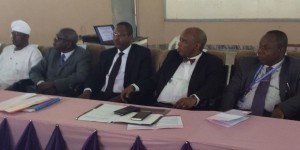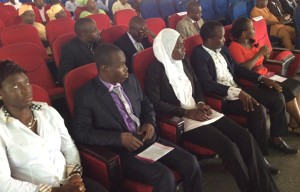History was made in Akure, south-west Nigeria, on Monday March 23, 2015 as the first set of Doctor of Philosophy (Ph.D.) students under the West African Science Service Centre on Climate Change and Adapted Land Use (WASCAL) Graduate Research Programme (GRP) in West Africa Climate System officially passed out.

Hosted by the Federal University of Technology, Akure (FUTA) in Ondo State, the WASCAL Programme is a novel climate change initiative of the German government through the Ministry of Education and Research (BMBF). The Graduate Research Programme is a major component of WASCAL.
The students were “passing out” and not “graduating” in the real sense of the word because, even though they had satisfied all the requirements for the award of the degree and officially ended the programme, the conferment of the degrees on them will hold later in the year in November, when they are all expected to return to Akure to formally graduate.
The academic programme started on 23rd January, 2012 with 10 students, one from each of 10 West African countries that signed the WASCAL Treaty. The countries are: Benin, Burkina Faso, Cote d’Ivoire, Ghana, Mali, Niger, Nigeria, Senegal, The Gambia and Togo. However, the inability of The Gambia and Togo to fill their slots meant that countries like Nigeria and Ghana each had two representatives.
The graduating students are: Folorunsho Matthew Akinseye (Nigeria), Thompson Annor (Ghana), Adama Bamba (Cote d’Ivoire), Ulrich Jacques Diasso (Burkina Faso), Ayoola Oluwatomi Oluwadare (Nigeria), Moussa Mounkaila Saley (Niger), Coumba Niang (Senegal), Souleymane Sanogo (Mali), Toure Evelyne Ndatchor (Cote d’Ivoire) and Emmanuel Quansah (Ghana).

Minister of Environment, Laurentia Laraba Mallam, congratulated the students for their achievement and commended the organisers for the timely completion of the first circle of the programme. “This must have been possible partly through the dedication and commitment to duty by the WASCAL Centre and also through the cooperation and encouragement from the university authority and community,” she stated.
Mallam, who was represented by Peter Tarfa, a deputy director in the Department of Climate Change (DCC) in the Environment Ministry, disclosed that the WASCAL initiative started in 2009 when the German government notified the ministry. According to her, the centre’s aim is to engage in research with Africa that will help develop excellence as well as build institutions and capacities.
She added that government vigorously pursued the opportunity due to the fact that lack of adequate, reliable and verifiable scientific research findings, data and information on climate change in Africa and in Nigeria had continued to be a major challenge against effective policies and actions to combat climate change.
While FUTA operates the Ph.D. programme, the Federal University of Technology (FUT), Minna in Niger State was offered a status to run the Master of Science (MSc) degree programme under the WASCAL initiative.
The minister listed the benefits of hosting the centres to include “socio-economic implications for Nigeria; added benefit to the nation’s research potential; proximal benefit to our research institutions and the opportunity for Nigeria to drive the process.”
She recalled that, while building on the initiative, government last year installed a state-of-the-art High Performance Computing (HPC) system in the FUTA WASCAL Centre to further enhance the centre’s data management.
“The ministry also collaborated and undertook a training aimed to enhance capacity of the Climate Change Designated Government National Focal Point as well as other climate change experts in climate change information management for decision-making process towards policy formulation and implementation,” she added, even as she urged the university and centre’s management to explore options of availing wider spectrum of stakeholders the services of the centre and the climate information for use in research and in many socio-economic sectors of the nation.
She restated government’s determination to sustain “the beneficial initiative” and promised that it would continue to fulfill its obligations under the WASCAL Cooperative agreement and also support and partner the centre to initiate, plan and finance training activities that would showcase the importance and practical use of climate information.
She expressed government’s appreciation to the Government of Germany, the German Ministry for Education for “the laudable initiative.” Mallam likewise thanked the management of the WASCAL administrative headquarters in Accra, Ghana for effectively steering the regional initiative.
Vice-Chancellor of FUTA, Prof Adebiyi Durodola, described the programme as “a worthwhile experience because they (students) brought the international flavor here”.
He added: “We are as excited as you are that our first set of WASCAL products are being released into the market. The programme has been beneficial as we were able to get some experience from the United Nations Development Pogramme (UNDP), and we have been able to domesticate the agreement. We look forward to a more robust collaboration.
“We call on the German Government to continue to fund the programme as it has been highly beneficial to the continent. Indeed, no amount spent on human development goes to waste.”
Professor Jerome Omotosho, director of the WASCAL-GRP, who described the initiative as “this very unique manpower development programme for West Africa,” disclosed that FUTA on August 2010 beat nine other universities to be selected as lead university to host the doctorate programme.
Omotosho, a professor of Meteorology, declared that students have worked very hard to meet set target “as the WASCAL approved period for the Ph.D. programme is normally three years and this formally ended on 31st January, 2015.”
Speaking on behalf of the students, Annor expressed their delight and gratitude to the German Government and WASCAL for sponsoring the programme. They also thanked the academic and administrative team at FUTA.
He said: “It was really a wonderful experience during the field work and the entire period of our studies. Having the opportunity to visit many countries, we’ve been acquainted with diverse cultures which have prepared us to a versatile world.
“On the side of academics, though challenging, we were able to sail through with the help of WASCAL, our supervisors, institutions visited, FUTA and other institutions and individuals. Our humble plea to the sponsors is that the period for the programme is short and for that matter making room for extension will be helpful. We pledge to impart Africa and the world at large with all that we’ve learnt during this special Ph.D. programme.”
